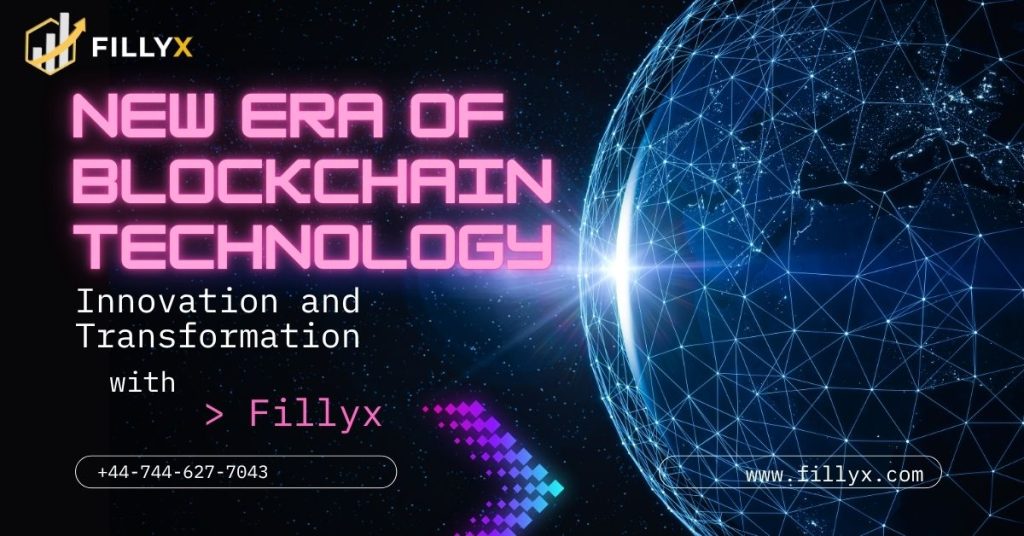Why Pakistani Startups Should Embrace Blockchain Technology

In the rapidly evolving global tech landscape, blockchain technology has emerged as a transformative force, redefining industries from finance to agriculture. For Pakistani startups, embracing blockchain offers a unique opportunity to leapfrog traditional barriers, enhance operational efficiency, and compete on a global scale. With Pakistan’s young, tech-savvy population and a growing digital economy, the potential for blockchain to drive innovation is immense. This article explores the transformative potential of blockchain technology for Pakistani startups and freelancers, highlighting its benefits and how platforms like Fillyx are paving the way for seamless cryptocurrency in Pakistan. Understanding Blockchain Technology Blockchain is basically a digital record book shared across many computers. It keeps track of transactions in a secure, transparent way that can’t be changed. Each entry, or “block,” connects to the one before it, forming a chain that’s permanent and trustworthy. This system eliminates the need for intermediaries like banks, ensuring efficiency and trust. Key features of blockchain technology include: Decentralization: No single entity controls the system, reducing reliance on centralized institutions. Transparency: All transactions are visible to network participants, fostering accountability. Immutability: Once recorded, data cannot be altered, ensuring trust and fraud prevention. Efficiency: Automation reduces manual processes, cutting costs and errors. These attributes make blockchain a powerful tool for industries worldwide, and Pakistan’s growing startup ecosystem stands to benefit significantly from its adoption. The Rise of Blockchain in Pakistan Pakistan is no stranger to technological disruption. With over 60% of its population under 30 and a burgeoning startup ecosystem, the country is well-positioned to harness emerging technologies. The formation of the Pakistan Crypto Council (PCC) in March 2025 marked a pivotal moment, signaling government support for blockchain and digital assets. 1. Strengthening Security and Preventing Fraud Cybersecurity is a pressing concern for businesses in Pakistan, where data breaches and fraud can undermine trust. Blockchain’s advanced cryptographic protocols protect sensitive information, making it nearly impossible for unauthorized parties to access or manipulate data. 2. Empowering Financial Inclusion Pakistan has a significant unbanked population, with many individuals lacking access to traditional banking services. This creates barriers to financial participation, especially for freelancers and small businesses. Blockchain-based solutions, such as cryptocurrency payments and decentralized finance (DeFi) platforms, enable direct, low-cost transactions. 3. Streamlining Operations with Smart Contracts Smart contracts—self-executing agreements coded on the blockchain—automate processes by executing terms when predefined conditions are met. For example, a freelancer could receive payment automatically upon project completion, eliminating delays or disputes. 4. Building Trust Through Transparency In industries like e-commerce, supply chain, and freelancing, trust is paramount. Blockchain’s immutable ledger ensures that all transactions are permanently recorded and verifiable, reducing the risk of disputes. For instance, a Pakistani startup selling handmade goods online can use blockchain to prove the authenticity of its products, boosting customer confidence. 5. Unlocking New Funding Opportunities Raising capital is a significant challenge for Pakistani startups. Blockchain introduces innovative fundraising models like Initial Coin Offerings (ICOs) and Security Token Offerings (STOs). These allow startups to issue digital tokens to investors worldwide, democratizing access to funding. Steps for Pakistani Startups to Embrace Blockchain Identify Use Cases Startups should assess their industry’s pain points and identify blockchain applications that address them. For example, fintech startups can focus on DeFi. Partner with Experts Collaborating with blockchain development firms like Appinventiv or SoluLab can bridge technical gaps. These firms offer expertise in smart contract development, DApps, and compliance. Leverage Government Support The PCC’s initiatives provide a supportive framework. Startups should engage with the council to access resources, regulatory guidance, and international partnerships. Invest in Education Training teams in blockchain technology is crucial. Startups can partner with universities or offer workshops to build in-house expertise. Start Small Pilot projects can help startups test blockchain applications without significant upfront costs. For example, a small-scale NFT fundraising campaign can demonstrate viability before scaling. Focus on User Experience Blockchain solutions must be user-friendly to gain traction. Startups should prioritize intuitive interfaces and clear value propositions. The Future of Blockchain in Pakistan Pakistani government is embracing blockchain technology through initiatives like the Digital Pakistan Vision, which champions digital innovation. Startups that proactively adopt blockchain will gain a strategic advantage, positioning themselves as leaders in this transformative wave. Conclusion Blockchain technology holds immense potential for Pakistani startups, delivering unparalleled security, operational efficiency, and financial inclusion. By incorporating blockchain into their operations, startups can enhance trust, lower costs, and broaden their market presence. Ready to revolutionize your startup with the power of blockchain? The Fillyx platform offers Pakistani startups a secure, scalable, and user-friendly solution to integrate blockchain technology seamlessly. Sign up with Fillyx now and unlock the potential of blockchain for your business. Get Started with Fillyx. Follow More: LinkedIn FAQS Fillyx offers user-friendly blockchain tools, consulting, and integration support designed for Pakistani startups. From smart contract development to decentralized app creation, Fillyx empowers you with resources and expertise to succeed. 1. What is blockchain technology, and why is it relevant for Pakistani startups? Blockchain is a decentralized, secure digital ledger that records transactions transparently. For Pakistani startups, it offers solutions like secure payments, transparent supply chains, and trust-building with customers, which are critical in a fast-growing, digital-first economy. 2. How can blockchain benefit my startup’s operations? Blockchain can streamline operations by reducing costs, enhancing security, and improving efficiency. For example, it enables faster cross-border payments, eliminates intermediaries in supply chains, and protects sensitive data from cyber threats. 3. Is blockchain technology expensive to implement for startups in Pakistan? While initial setup costs exist, blockchain solutions are becoming more affordable with platforms like Fillyx offering scalable tools. Startups can start small with cloud-based blockchain services and scale as they grow, minimizing upfront investment. 4. What industries in Pakistan can benefit most from blockchain? Industries like fintech, e-commerce, agriculture, healthcare, and logistics in Pakistan can leverage blockchain for secure transactions, supply chain transparency, patient data management, and more. Fillyx provides tailored solutions for these sectors. 5. How can Fillyx help my startup adopt blockchain technology? Fillyx offers user-friendly blockchain tools, consulting, and integration
The Future Is Decentralized: How Blockchain Can Transform Pakistani Startups

Blockchain technology is emerging as a transformative solution for these issues. By enabling fast, secure, and low-cost transactions, blockchain empowers freelancers with greater financial control and independence. Cryptocurrency, powered by blockchain, minimizes fees and eliminates long processing times, providing an efficient alternative to conventional payment channels. For startups and freelancers alike, blockchain in business is no longer just an option—it’s becoming a necessity. As Pakistan continues its journey toward digitalization, embracing blockchain can unlock new opportunities, drive financial inclusion, and enhance economic flexibility. This article delves into why Pakistani startups should adopt blockchain technology, the key benefits it brings, and how platforms like Fillyx are paving the way for seamless crypto adoption across the country. What is Blockchain Technology? Blockchain is a decentralized is secure ledger that records transactions across a network of computers, ensuring transparency and immutability. Each transaction is verified by participants and stored in a chain of blocks, making it tamper-proof and trustworthy. Key Features of Blockchain: Decentralization: Removes the need for middlemen like banks. Transparency: All transactions are visible to network participants. Security: Encrypted and unchangeable records prevent fraud. Efficiency: Automates processes, cutting costs and errors. Blockchain is revolutionizing industries globally, and Pakistani startups can leverage it to stay competitive. How Blockchain Can Transform Pakistani Startups? Robust Security for Trustworthy Operations Pakistan’s businesses face growing cyber threats. Blockchain’s cryptographic protection secures sensitive data, reducing fraud risks and building customer trust for startups in e-commerce, fintech, and beyond. Empowering Financial Inclusion With a significant unbanked population in Pakistan, blockchain enables fast, low-cost transactions through cryptocurrencies and DeFi platforms. Startups can reach underserved customers, offering seamless financial services. Smart Contracts for Streamlined Processes Smart contracts automate agreements, executing terms when conditions are met. This reduces reliance on intermediaries, saving time and costs for startups in logistics, real estate, or legal sectors. Building Trust Through Transparency In Pakistan’s competitive markets, trust is vital. Blockchain’s immutable records ensure transparent transactions, minimizing disputes and fostering confidence in sectors like supply chain and retail. Seamless Cross-Border Transactions High fees and slow banking processes hinder international trade. Blockchain enables direct, low-cost peer-to-peer payments, helping Pakistani startups expand globally with ease. Innovative Fundraising with Tokenization Raising capital is a challenge for startups. Blockchain offers solutions like ICOs and STOs, allowing entrepreneurs to tokenize assets and attract investors worldwide, democratizing funding opportunities. Challenges of Blockchain Adoption in Pakistan Regulatory Uncertainty: Pakistan’s government has expressed interest in blockchain but maintains a cautious stance on cryptocurrencies. A proposed bill to ban private cryptocurrencies could stifle innovation if not balanced with clear regulations. Startups must navigate this uncertainty to ensure compliance. Infrastructure Limitations: Blockchain requires robust internet connectivity and computing resources, which are inconsistent in parts of Pakistan. High energy costs for mining activities also pose challenges. Public Perception and Awareness: Skepticism about blockchain, fueled by high-profile crypto scams like FTX, persists. Only 44% of Americans say they would never purchase cryptocurrency, and similar sentiments may exist in Pakistan, where awareness of blockchain’s broader applications is low. Environmental Concerns: Blockchain’s energy-intensive processes, particularly for proof-of-work systems like Bitcoin, raise sustainability concerns. Startups must adopt energy-efficient solutions like proof-of-stake to mitigate this. Despite these challenges, regulatory sandboxes and government initiatives, such as the Digital Pakistan Policy, signal growing support for blockchain innovation. Startups can leverage these opportunities to drive adoption. The Role of Platforms in Driving Blockchain Adoption Platforms play a crucial role in simplifying blockchain adoption for startups. By providing tools for tokenization, smart contract development, and decentralized app (DApp) creation, these platforms lower the technical barriers for entrepreneurs. They enable startups to focus on innovation rather than infrastructure, accelerating growth in Pakistan’s nascent blockchain ecosystem. Call to Action The future of Pakistani startups is decentralized, and the time to act is now. Embrace the power of blockchain to transform your business, reduce costs, and access global opportunities. With our platform, you can seamlessly integrate blockchain solutions tailored to your startup’s needs, from fundraising to supply chain transparency. Visit Fillyx.com today to explore how our platform can empower your startup to thrive in the decentralized economy. Join the revolution—build, innovate, and lead with Fillyx! Q1: What is blockchain, and how does it benefit Pakistani startups? Blockchain is a decentralized digital ledger that records transactions securely and transparently. For Pakistani startups, it reduces costs, enhances trust, and provides access to global markets, enabling innovation in fintech, agritech, and more. Q2: How can blockchain help with funding for Pakistani startups? Blockchain enables decentralized crowdfunding through token sales or ICOs, allowing startups to raise capital from global investors without relying on traditional financial institutions. What are the challenges of adopting blockchain in Pakistan? Challenges include regulatory uncertainty, energy consumption, technical expertise shortages, and public skepticism. Solutions involve compliance-focused platforms, energy-efficient blockchains, and education initiatives. How does our platform Fillyx support startups? Fillyx provides user-friendly tools for tokenization, smart contract deployment, and DeFi solutions, enabling startups to integrate blockchain without extensive technical expertise. Is blockchain secure for startup applications? Yes, blockchain’s immutable and transparent nature ensures secure transactions. Smart contracts further enhance security by automating processes and reducing human error. Recent Post
